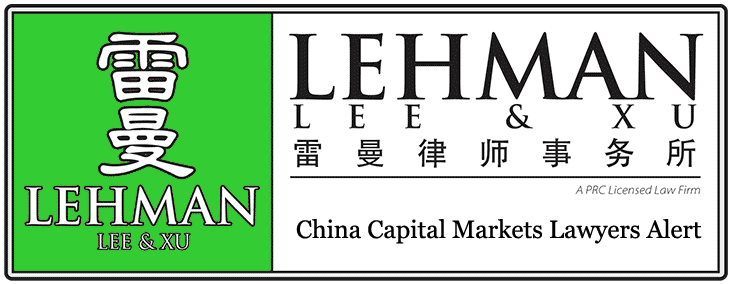
 |
|
LEHMAN, LEE & XU China Lawyers
|
|
China Capital Markets law In The News
|
|
July 2013
|
The China Law News keeps you on top of business, economic and political events in the China. |
|
|
|
In the News |
China exports slide raises doubts about currency policy |
SHANGHAI - China's bet that it could reap the benefits of a more powerful yuan without paying a price in competitiveness is looking increasingly risky. An unexpected slump in exports in June marked the latest worrying sign of a slowdown in the world's second-biggest economy and raised the prospect that regulators may be forced to drag the yuan back down after a massive rally this year. Unfortunately for policymakers, while a weaker yuan might improve the price of Chinese goods sold abroad, it will not be the cure all for exporters. Other factors are driving up production costs at Chinese companies and undermining their competitiveness abroad. Still, economic reformers at the People's Bank of China (PBOC) will come under pressure to use brute-force exchange rate manipulation to stave off a potentially destabilizing round of factory layoffs. Liu Ligang, Greater China chief economist at ANZ bank in Hong Kong, said some sort of adjustment - including pushing the currency lower - was likely since policymakers were behind the curve in dealing with a longer downturn in exports demand than expected. "PBOC policy needs to be corrected according to the changed external environment," he said. While the yuan, or renminbi, has only risen 1.5 percent against the dollar so far this year, it has posted significantly greater appreciation against other Asian currencies, Liu said. "If you look at the renminbi crosses against the yen, Asian currencies, the Korean won, you see gains of 10 to 20 percent. It is the crosses that are so worrisome because China has to compete with ASEAN economies ... We may see more layoffs by Chinese manufacturing as a result." The currency factor could have a particular impact on China's heavy equipment and shipbuilding sectors, which compete with Japanese and Korean products, analysts said. The vulnerability of some Chinese companies was underlined by China Rongsheng Heavy Industries Group 1101.HK, China's largest private shipbuilder, which appealed for financial help from the Chinese government and big shareholders on Friday. DISTORTED FIGURES Chinese export figures have been on a roller coaster ride in 2013, and the currency has played an outsized role. Officials widely blamed a strong performance in exports earlier this year on speculative inflows of currency disguised as exports, a maneuver to get around capital controls. Exports in June declined 3.1 percent from a year earlier, flabbergasting a market that had expected 4 percent growth. But Bank of America Merrill Lynch economists Zhi Xiaojia and Lu Ting argue June's fall was attributable in part to possible statistical manipulation by Chinese customs. "Customs might have had to deflate trade data in June to neutralize previous over reporting," they wrote in a research note. In short, exports in June might have been stronger than the official data, they said. They predicted the yuan will stop appreciating against the dollar and could even depreciate mildly in upcoming months. Currency traders suspect that Beijing had expected global demand to pick up this year before the exchange rate became an issue. They may have let the yuan market get carried away and are now paying the price, the traders say. The yuan began to gain steadily against the dollar in July 2012. Initially, the central bank attempted to hold the surge back by controlling the midpoint rate, a level it sets daily and from which the exchange rate can diverge by 1 percent in either direction. But dissatisfied Chinese banks and corporate treasurers refused to trade in the mandated range, causing a collapse in market liquidity of several weeks. The situation changed when the United States and Japan began printing money to stimulate their respective economies, causing funds to bail out of dollars into higher-yielding emerging market currencies, including the yuan. Speculative inflows in April and May this year helped push the yuan repeatedly to record highs against the dollar. THE RIGHT DECISION Letting the yuan rise was precisely what mainstream economists and China's trade partners had been calling for. "There are always tradeoffs," said Zhu Haibin, China chief economist for JP Morgan. "On the one side is trade, on the other side is financial liberalization, currency liberalization and renminbi internationalization. The second camp has more support from the Party." In addition to silencing criticism from trade partners that the currency was being manipulated to support exports, the stronger yuan brought other benefits like cheaper imports, which could help to stimulate domestic consumption, a key goal for China's economic restructuring. Cheaper oil and gas imports helped hold back inflation for one of the world's most energy intensive economies. The rally also reinvigorated interest in the offshore yuan market, which had stalled for much of 2012 after the yuan sank in response to the Greek debt crisis. NOT MUCH HELP Now, as policymakers face pressure to push the yuan down, Liu at ANZ suggests a cheaper currency would not help exports much anyway. "China's competitiveness loss is not only coming from the strong renminbi," Liu said. Relatively high prices for energy, land, water and labor are all conspiring to drive up production costs, he says. Indeed, even without Beijing intervention, the yuan may reverse course anyway as investors shift towards the dollar as speculation grows the U.S. Federal Reserve is edging towards reining in its stimulus program. Government officials have also reiterated their commitment to currency reform, including a further opening of the capital account and introducing more room for volatility by widening the official intraday trading band. "In the second half we expect to see more two-way volatility, both rising and declining, but overall stability," said Zhu of JP Morgan. http://www.abs-cbnnews.com/business/07/12/13/china-exports-slide-raises-doubts-about-currency-policy
|
|
|
|
|